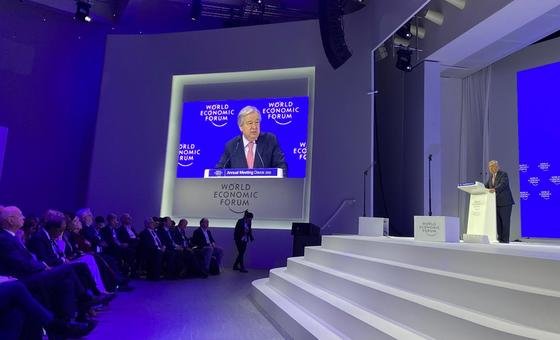The top UN official said this in a message to senior leaders, heads of state and heads of major companies who gather for this meeting held in Davos, Switzerland every January.
This year, the theme of the Economic Forum meeting is Constructive Cooperation for an Intelligent Age.
There is currently little evidence of mutual cooperation and intelligence, he warned. But it’s becoming clear that the world’s problems are getting worse – from violent conflict to inequality and attacks on human rights.
According to the head of the United Nations, now nuclear war is not the only threat to the existence of humanity. There is also the risk of the climate crisis and the expansion of the use of artificial intelligence (AI) without any regulatory mechanisms.
Fossil fuel addiction
Secretary-General Guterres said no one can escape the growing addiction to fossil fuels.
The world’s 13 largest ports for oil supertankers face the challenge of rising sea levels, caused by rising temperatures and melting frozen waters. A major reason for this is the use of coal, crude oil and natural gas.
He noted that large numbers of financial institutions and industries are backing away from climate commitments, which is self-indulgent and self-defeating.
Antonio Guterres said that later this year, the annual United Nations Climate Conference (COP30) will be held in Brazil, where world leaders will have to develop new national climate action plans.
He said climate finance for developing countries needs to be scaled up, but all businesses and financial institutions must develop concrete, and accountable, transition plans.
Benefits, Risks Inherent in AI
According to the Secretary-General, the next big threat to the world’s existence is AI, which is a double-edged sword. These technologies are revolutionizing teaching and learning, diagnosing diseases and increasing farmers’ productivity.
But the lack of proper regulation can disrupt the economy, undermine trust in institutions, and deepen inequality.
In September last year, UN member states passed the Memorandum of Understanding for the Future, which presents a roadmap for harnessing the immense potential of digital technology.
Additionally, a plea is made to bridge digital divides and adopt a shared vision for using AI to benefit humanity.
Reforming institutions
The UN chief said that despite the current challenges, the UN will never back down in its efforts to promote peace, international law and the principles of sovereignty, political independence and territorial integrity based on the UN Charter.
According to him, global institutions, from the existing financial system to the UN Security Council, need to be reformed, as they are not fully capable of dealing with the current challenges.
He said that these challenges can be faced through political will, but perhaps the leaders do not understand it, he said, he urged to face these problems unitedly.

